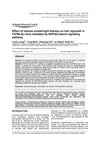 22 citations,
March 2009 in “Journal of Natural Medicines”
22 citations,
March 2009 in “Journal of Natural Medicines” Erica multiflora plant extract can help hair grow by stimulating growth-related cells and triggering hair cycle changes.
 33 citations,
January 2006 in “Journal of Dermatological Science”
33 citations,
January 2006 in “Journal of Dermatological Science” A long-acting Vitamin C derivative helps hair grow by stimulating cells and increasing growth factors.
 75 citations,
October 2002 in “Journal of Dermatological Science”
75 citations,
October 2002 in “Journal of Dermatological Science” Sophora flavescens extract may help hair grow by affecting growth factors and blocking a hair-related enzyme.
 7 citations,
January 2020 in “Scientific Reports”
7 citations,
January 2020 in “Scientific Reports” Rabbit skin analysis showed changes in hair growth and identified miRNAs that may regulate hair follicle development.
August 2022 in “International Journal of Molecular Sciences” DNA methylation controls lncRNA2919, which negatively affects hair growth.
 18 citations,
March 2016 in “Cosmetics”
18 citations,
March 2016 in “Cosmetics” Telogen Effluvium is a condition causing excessive hair loss due to stress, illness, drugs, or hormonal changes, and can be treated with specific products or naturally resolves after 3-4 years.
 May 2024 in “Cell proliferation”
May 2024 in “Cell proliferation” Melatonin helps hair grow by activating a specific signaling pathway.
 3 citations,
March 2020 in “International Journal of Molecular Sciences”
3 citations,
March 2020 in “International Journal of Molecular Sciences” Thymosin β4 helps increase hair growth in Cashmere goats.
 1 citations,
May 2018 in “Tropical Journal of Pharmaceutical Research”
1 citations,
May 2018 in “Tropical Journal of Pharmaceutical Research” Intense pulsed-light therapy helps mice grow hair by activating a specific growth pathway.
 4 citations,
September 2020 in “BioMed Research International”
4 citations,
September 2020 in “BioMed Research International” Timosaponin BII, a plant extract, was found to promote hair growth in mice, similarly to minoxidil.

Chrysanthemum zawadskii extract may help treat hair loss by promoting hair growth and affecting growth factors.
 4 citations,
October 2018 in “Experimental Dermatology”
4 citations,
October 2018 in “Experimental Dermatology” Dermoscopy shows that diffuse alopecia areata progresses through specific hair growth stages.
 April 2024 in “Cellular signalling”
April 2024 in “Cellular signalling” Activating TRPMLs helps human cells important for hair growth and increases hair growth in mice.
 May 2024 in “Chemical engineering journal”
May 2024 in “Chemical engineering journal” New treatment using Minoxidil and EGCG with ionic liquids improves hair growth and quality for hair loss.
 7 citations,
July 2022 in “Pharmaceutics”
7 citations,
July 2022 in “Pharmaceutics” The microneedle device with rapamycin and epigallocatechin gallate effectively promoted hair regrowth in mice.
September 2024 in “Journal of Ethnopharmacology” Terminalia bellirica extracts effectively promote hair regrowth and treat androgenetic alopecia.
 29 citations,
September 2012 in “Dermatologic Clinics”
29 citations,
September 2012 in “Dermatologic Clinics” Hair disorders are caused by a complex mix of biology, genetics, hormones, and environmental factors, affecting hair growth and leading to conditions like alopecia.
 9 citations,
April 2019 in “International journal of molecular sciences”
9 citations,
April 2019 in “International journal of molecular sciences” Human hair grows better in a special gel that mimics skin.
 1 citations,
November 2014 in “Journal of Biomedical Optics”
1 citations,
November 2014 in “Journal of Biomedical Optics” Reflectance spectroscopy can noninvasively track hair growth stages by measuring skin reflectance and melanin changes.
103 citations,
April 2005 in “Experimental dermatology” Prostaglandin F2alpha and related compounds can increase hair growth and darken hair in mice.
 22 citations,
February 2017 in “Clinical and Experimental Dermatology”
22 citations,
February 2017 in “Clinical and Experimental Dermatology” Icariin helps mouse hair grow by boosting a growth factor in skin cells.
 January 2024 in “Cosmetics”
January 2024 in “Cosmetics” HAIR & SCALP COMPLEX may help treat hair loss by stimulating hair growth and restarting the hair cycle.
 16 citations,
October 2018 in “Biochemical and Biophysical Research Communications”
16 citations,
October 2018 in “Biochemical and Biophysical Research Communications” Sildenafil, often used for erectile dysfunction, may help hair growth.
 25 citations,
November 2012 in “Phytotherapy Research”
25 citations,
November 2012 in “Phytotherapy Research” Crataegus pinnatifida extract may help increase hair growth and thickness in mice.
 25 citations,
July 2016 in “The journal of investigative dermatology/Journal of investigative dermatology”
25 citations,
July 2016 in “The journal of investigative dermatology/Journal of investigative dermatology” Imiquimod cream activates hair follicle stem cells and causes early hair growth by changing immune cells and certain protein expressions.
 31 citations,
March 2013 in “Gene”
31 citations,
March 2013 in “Gene” Signaling pathways are crucial for hair growth in goats.
 144 citations,
July 2002 in “Clinical and Experimental Dermatology”
144 citations,
July 2002 in “Clinical and Experimental Dermatology” Telogen effluvium is a common type of hair loss that can resolve on its own or become chronic, with treatment depending on early diagnosis.

AMPLEX PLUS may reduce hair loss and promote new hair growth.
 35 citations,
July 2018 in “Cell Reports”
35 citations,
July 2018 in “Cell Reports” The study found that a specific area of the hair follicle helps start hair growth by reducing the blocking effects on certain cells and controlling growth signals.
 30 citations,
December 2018 in “International Journal of Biological Macromolecules”
30 citations,
December 2018 in “International Journal of Biological Macromolecules” Chitosan and surface-deacetylated chitin nanofibers may help treat hair loss.



























